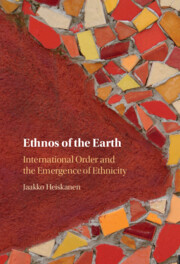Introduction
Published online by Cambridge University Press: 12 December 2024
Summary
Despite ubiquitous references to ‘ethnicity’ in both academic and public discourse, the history and politics of this concept remain largely unexplored. By constructing the first transnational and interlingual conceptual history of ethnicity, this book unearths the pivotal role that this concept played in the making of the international order. After critiquing existing accounts of the ‘expansion’ or ‘globalisation’ of international society, the chapter proposes to rethink the birth of the international order through a scrutiny of its major concepts. Fusing Reinhart Koselleck’s method of conceptual history with the philosophical writings of G. W. F. Hegel and Jacques Derrida, the chapter theorises the emergence of the international order as a dialectical process that both negated and preserved existing imperial hierarchies. The concept of ethnicity is ejected by this dialectical process as a residual category – an indigestible kernel of difference and particularity – that cannot be internalised by the work of sublation.
Keywords
- Type
- Chapter
- Information
- Ethnos of the EarthInternational Order and the Emergence of Ethnicity, pp. 1 - 28Publisher: Cambridge University PressPrint publication year: 2024

